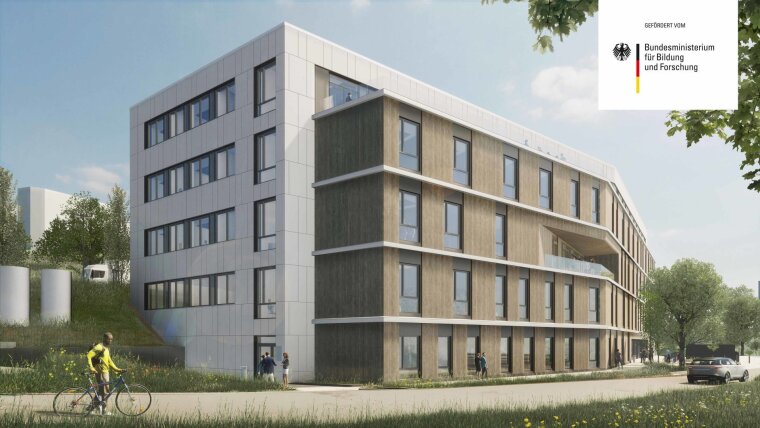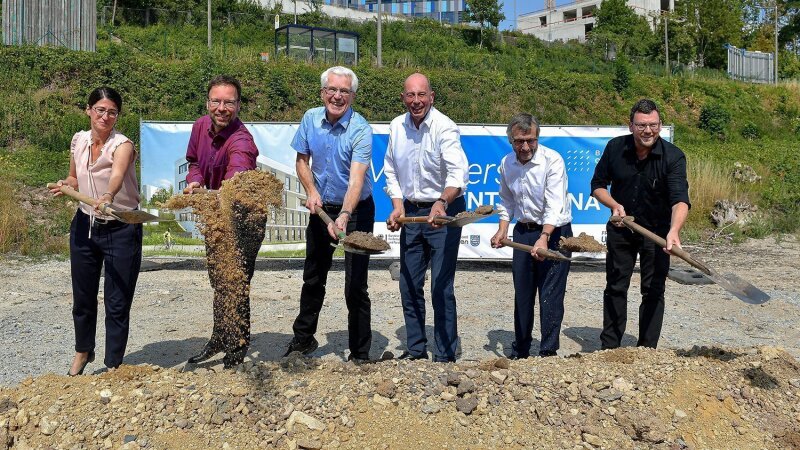
- Event
Published: | By: Axel Burchardt
Prof. Barbara Schönig, Thomas Nitzsche, Prof. Axel Brakhage, Wolfgang Tiefensee, Prof. Walter Rosenthal and Michael Rommel (from left) give the symbolic starting signal for construction of the Microverse Center Jena.
Image: Jürgen Scheere (University of Jena)In the presence of prominent representatives of science and politics, construction work for the new research building “Microverse Center Jena” officially began today. South of the Beutenberg Campus, research groups of Friedrich Schiller University Jena’s “Balance of the Microverse” Cluster of Excellence will have more space in the future to study the dynamics of microorganisms that have a major impact on our planet.
University of Jena President Prof. Walter Rosenthal, coordinator of the Cluster of Excellence Prof. Axel Brakhage, Thuringian Science Minister Wolfgang Tiefensee and Prof. Barbara Schönig, State Secretary in the Thuringian Ministry of Infrastructure and Agriculture, took up the spade to give the symbolic starting signal for the new building project, which the University of Jena is managing itself.
“Microbiology has been one of Jena’s strengths for decades,” said University President Prof. Walter Rosenthal. “The University and its partners being awarded the Cluster of Excellence is the highpoint so far. The new building provides additional opportunities to consolidate and expand this position and to underpin the strength of Jena’s performance with further outstanding research results.”
“With the Federal Government’s award of the ‘Balance of the Microverse’ Cluster of Excellence, Jena has established itself as an internationally significant science centre for the long term,” Thuringia’s Science Minister Wolfgang Tiefensee also emphasised. This was due not least to the enormous potential of the research location at the interface of life sciences and optics. “At the same time, this success was also the result of the state’s consistent science policy – from the annual increase in university funding to the expansion of the non-university research institutions located in Jena,” said Tiefensee.
“Through a joint effort of the University, the state and the Federal Government, a centre of top-level research with a global profile is being created on the Beutenberg site with the Microverse Center Jena. The Free State of Thuringia is funding this new research building with around 22.6 million euros of Thuringian state funds from the construction budget. This is being supplemented by 20.6 million euros in federal funding from the Higher Education Pact 2020 and 7.2 million euros of the University of Jena’s own funds. The level of state funding for the Microverse Center Jena, as well as the continuous expansion of science infrastructure on the Beutenberg, clearly show that the promotion of international excellence in research is a central concern of the Free State of Thuringia,” added State Secretary Prof. Barbara Schönig.
Strengthening interdisciplinary cooperation
With almost 5,000 square metres of usable space, the Microverse Centre Jena will become the new heart of the Cluster of Excellence “Balance of the Microverse”, as the new building particularly strengthens the interdisciplinary cooperation of the research areas.
“The new laboratories with state-of-the-art equipment will provide the new professorships and research groups with excellent research infrastructure and form the centre of gravity for the Microverse Cluster,” said Cluster of Excellence coordinator Prof. Axel Brakhage.
In addition to the new professorships, several junior research groups and the “Microverse Imaging Centre” – the microscopy centre of the Cluster of Excellence – will move into the building. The planned conference area with a coffee point and a variety of communication spaces will encourage interdisciplinary discussion. The building, designed by hks Architekten GmbH and with features including a sustainable wooden façade, large heat storage tanks and a photovoltaic installation with a green roof, will provide space for 170 scientists and 30 non-academic staff. A further 35 workspaces are also planned for doctoral candidates and visiting researchers.
Completion of the building is planned for the end of 2024. “We are particularly grateful to the Federal Government as well as the Free State of Thuringia, but of course also to the University of Jena, for the financial support for the new research building and the accompanying investment in scientific research and technology development,” said Prof. Axel Brakhage.
Understanding interactions between microorganisms
The Cluster of Excellence, which was obtained by Friedrich Schiller University Jena in 2018, brings together researchers from different disciplines to conduct joint research on the dynamics of microbial communities on Earth. There are microorganisms virtually everywhere and they live in harmony with other organisms, both large and small. If the equilibrium of their coexistence is disrupted, this can have severe consequences, such as extreme weather events, crop failures or the spread of diseases. The mission of the Cluster of Excellence is to gain a profound understanding of the interactions of microorganisms with each other and with other living organisms. With this knowledge, the researchers want to determine the causes of imbalances and find out how the balance of such a system can be restored.
